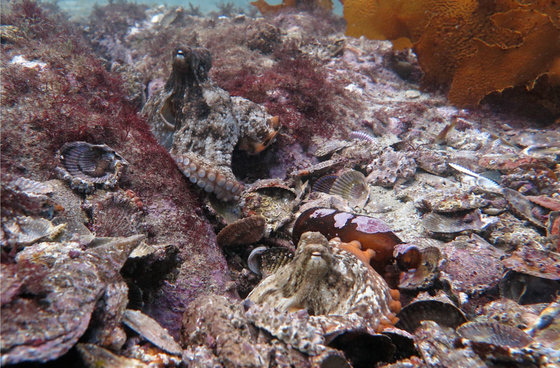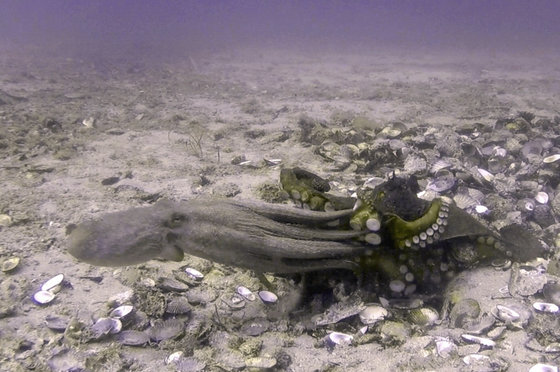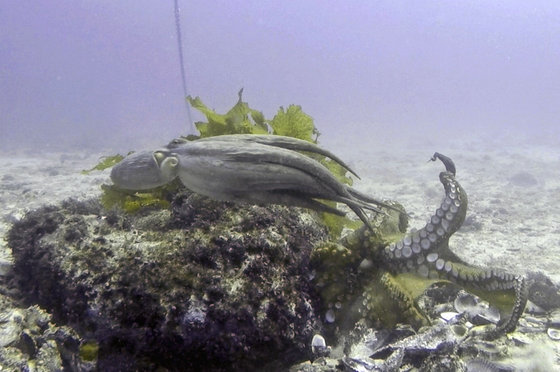Octopus builds a small "city" and lives socially with groups

In 2009, a group of divers by multiple people discovered an octopus "town" made of waste metal. In "town", several octopuses live together, and the divers who discovered named this octopus nest "octopolis". At the time octopolis was discovered, scientists believed that humans were like by-products made from polluting the environment. However, in 2016, another "octopus" living in a flocking "town" was found, there was no waste such as metals and there was a new discovery that the octopuses live in the city building a group It is.
Why octopuses are are building small "cities" off the coast of Australia | Ars Technica
https://arstechnica.com/science/2017/09/why-octopuses-are-building-small-cities-off-the-coast-of-australia/
Dr. David Cher, a marine biologist at Alaska Pacific University and his colleagues,Taylor & Francis OnlineSo we are announcing research results on the city where octopuses found by divers. In the thesis, the town where octopuses found in 2016 are called "Ocratis", observations have been made for several months. According to observation results, Oklatis has about 10 to 15 "Octopus tetricusThere are octopos of the kind called "octopus" of kind and there is something like a living space built around the rock for several generations.

The lifetime of Octopus tetricus is about 3 years, so the time to live for each generation is relatively short, but hidden things thrown away in the sea like treasure such as a beer bottle and a fishing lure at the back of the shell mound which is a living space It is said that it is. The living space is created by gathering shells around the rock and setting a space in it.
The following image shows Ocritis found in 2016. Shell mounds spread out so as to enclose the gray rocky place, and there is an octopus living space under it. A small round point is a living space built by octopus, as if the octopus living apartment or something, the living space is divided into three and is gathered.

It was said that Oklatis' observation was filmed with a camera using a camera, and that octopuses took social action. At Ocritis, at least three groups of octopus groups were confirmed, and there were also octopuses trying to join their friends during observation. Scientists say octopus reproductive organs are optimized to allow long-range conception, so matings would have been quite odd for octopus octopuses. Usually, octopus males feed sperm lumps into females through water. And, as sperm lumps penetrate the female octopus skin and enter the body, usually octopuses do not interact with each other when mating.
Also, during observation, one octopus entered the nest, the octopus living from the inside was removed, and the other octopus again saw the hole created by the octopus ejected is. In addition, the confrontation of living space by octopus and octopus often leads to fight between octopuses as well. Besides, it seems that sharks waiting for octopus to come out of Oklatis were also confirmed.

In this way building Oklatis may lead to putting octopus itself in danger. Researchers are amazed at taking the social behavior that octopus octopus octopus has never seen before. And that social behavior is an act that risks the octopus' own body more than an octopus wandering on the sea alone.
Given the risk of spilling on yourself, why do the octopus dare to danger and form communities collectively? For that reason Mr. Cher said, "If there are octopus habitats in some places and food is abundant, perhaps such nests will be formed." In fact, both Octopolis and Oklatis form places where octopuses are hidden by the rocks and waste metals, and furthermore, by forming shell mounds around rocks and waste metals inhabitants such as scallops serving as octopus food It is also becoming the ground. In order to protect ourselves from foreign enemies and obtain stable foods, octopuses form the city, and they acquire social behavior among them.

According to Mr. Cher and his colleagues, octopus other than Octopus tetricus may live in a densely populated area, and the octopus may be present everywhere in the ocean than human beings think.
Related Posts:







